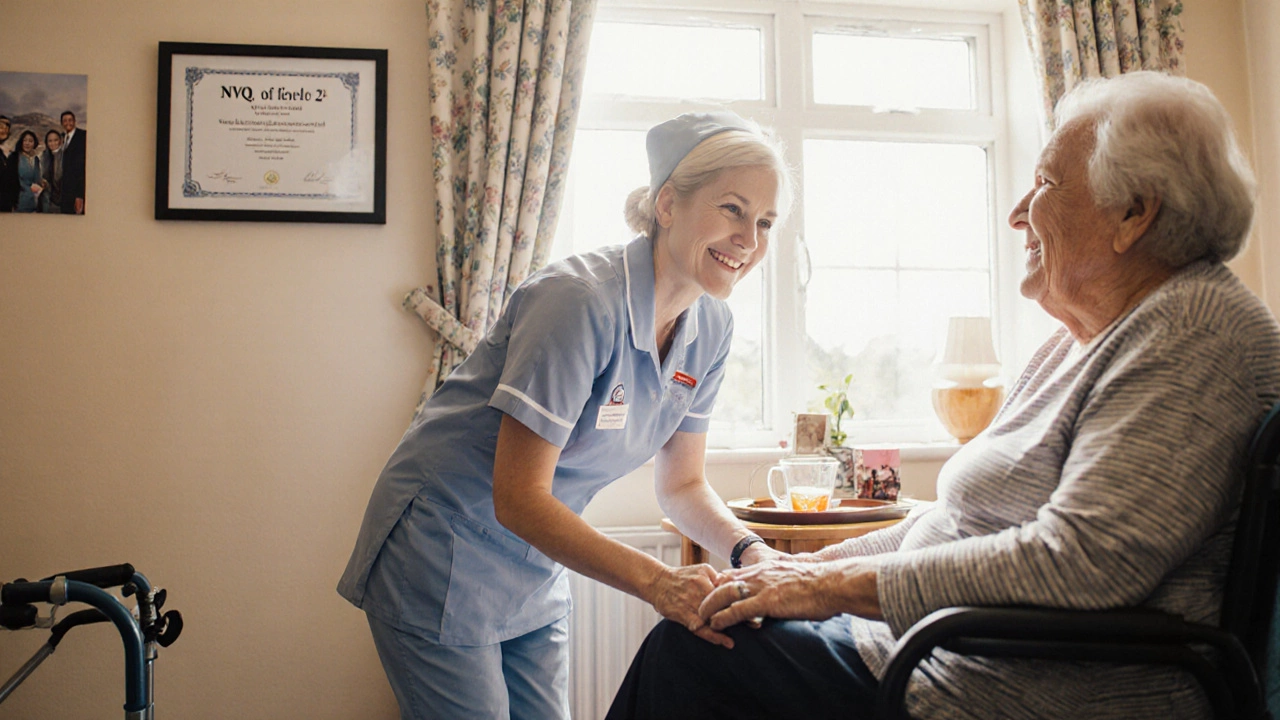Vocational Path Finder
Discover vocational careers that match your interests. Enter your preferences below to see matching qualifications, job roles, and salary expectations.
Think of a vocational qualification as a passport to a job-not just any job, but one where you actually do something with your hands, your mind, or both. It’s not about sitting in a lecture hall for three years memorizing theories. It’s about learning how to fix a boiler, code an app, weld steel, care for elderly patients, or run a kitchen. These qualifications are built around real work, not exams alone.
What Exactly Is a Vocational Qualification?
A vocational qualification is a certification that proves you’ve learned the practical skills needed for a specific job. Unlike academic degrees that focus on theory and research, vocational training tells employers: you can do this job today. These are often called work-based qualifications because you learn by doing, not just reading.
In the UK, you’ll see these under names like NVQs (National Vocational Qualifications), BTECs, City & Guilds, T Levels, and apprenticeships. Each one is tied to a real occupation-plumbing, nursing, IT support, carpentry, hospitality, or electrician work. They’re not just certificates; they’re proof you’ve been assessed in actual workplace settings.
For example, if you earn a Level 2 NVQ in Hairdressing, you’ve not only watched tutorials-you’ve cut hair on real clients under supervision. That’s the difference. Employers trust these because they know you’ve already done the work.
How Is It Different From a Degree?
Here’s the simple breakdown:
- A university degree teaches you how to think critically about a subject-like economics, history, or biology.
- A vocational qualification teaches you how to do a job-like installing solar panels, managing a restaurant, or operating CNC machines.
You don’t need a degree to become a qualified electrician. You need a Level 3 Electrical Installation qualification, which you get through apprenticeships and on-the-job training. The same goes for dental nurses, welders, or childcare workers. These jobs don’t require essays-they require competence.
And here’s something many people don’t realize: in many skilled trades, vocational qualifications are actually preferred. A 2023 survey by the UK Skills Agency found that 68% of employers in construction and manufacturing hire based on vocational credentials before considering degrees.
Who Are These Qualifications For?
Vocational training isn’t for people who didn’t do well in school. It’s for people who learn best by doing. It’s for teenagers who want to start earning after 16. It’s for adults switching careers at 35. It’s for people who hate sitting in classrooms but love fixing things, helping others, or building stuff.
You don’t need A-levels to start. Many Level 1 and Level 2 courses accept anyone over 16, even with no prior qualifications. Some are free if you’re under 24 or unemployed. Others are paid through apprenticeships-you earn while you learn.
Take Sarah, 19, from Birmingham. She left school with three GCSEs and felt stuck. She signed up for a Level 2 Diploma in Health & Social Care at a local college. Six months in, she started a paid apprenticeship at a care home. Now she’s on track to become a registered care worker-without a single university application.

How Do You Get One?
There are three main ways to earn a vocational qualification:
- College or Training Provider - You enroll in a course that mixes classroom learning with practical sessions. Many colleges offer part-time or evening options for working adults.
- Apprenticeships - You’re hired by a company and trained on the job. You get a wage, holiday pay, and your qualification. Apprenticeships range from Level 2 (equivalent to GCSEs) to Level 7 (equivalent to a master’s degree).
- Online or Distance Learning - Some qualifications, like IT certifications or first aid training, can be done remotely. But most hands-on trades still require in-person assessments.
Check the UK Government’s Find an Apprenticeship site or your local college’s website. Most offer free career advice to help you pick the right path.
What Jobs Can You Get With One?
Vocational qualifications open doors to hundreds of roles across industries. Here are a few real examples:
- Level 2 Certificate in Vehicle Maintenance → Automotive Technician
- Level 3 Diploma in Dental Nursing → Registered Dental Nurse
- Level 2 Award in Food Safety → Kitchen Supervisor in a restaurant or hospital
- Level 4 Certificate in Digital Marketing → Social Media Executive
- T Level in Health → Clinical Support Worker or Ward Administrator
Many of these jobs pay better than you’d expect. The average starting salary for a qualified electrician in the UK is £30,000. A skilled plumbing apprentice can earn £25,000 by age 21. These aren’t low-wage jobs-they’re skilled trades with clear career ladders.
Why Are They Becoming More Popular?
For years, society pushed everyone toward university. But now, employers are screaming for skilled workers. The UK has over 1 million job vacancies in skilled trades alone, according to the Confederation of British Industry (2025).
Young people are catching on. More 16- to 18-year-olds are choosing T Levels over A-levels. Employers are offering higher starting pay for certified workers. The government is investing millions to expand apprenticeships and reduce training costs.
It’s no longer about prestige-it’s about readiness. If you can fix, serve, build, or care, and you’ve got a qualification to prove it, you’re in demand.

What Are the Downsides?
No path is perfect. Vocational qualifications can be harder to switch from. If you train as a chef, moving into finance isn’t easy. Some qualifications aren’t recognized abroad unless they’re part of a European or international framework.
Also, not all providers are equal. Some private colleges charge high fees for low-quality training. Always check if the course is accredited by a recognized body like Ofqual (in England) or Qualifications Wales. Look for the official logo on their website.
And while you’re learning, you might earn less than a graduate. But you’ll also graduate with less debt-and a job already lined up.
Where Do You Start?
Ask yourself these three questions:
- What do you enjoy doing? (Fixing things? Helping people? Working with tech?)
- What kind of work environment suits you? (Outdoors? In a hospital? Behind a desk?)
- How soon do you want to start earning?
Then visit your local college or go to gov.uk/careers. Talk to a careers adviser. Don’t just pick what sounds easy-pick what fits your life.
There’s no shame in choosing a vocational path. In fact, in 2025, it’s one of the smartest moves you can make. You’ll learn real skills, earn while you learn, and walk into a job that actually needs you.
Is a vocational qualification worth it?
Yes-if you want to work in a skilled trade, healthcare, construction, IT support, or hospitality. These qualifications lead directly to jobs, often with better starting pay than degrees in unrelated fields. Employers value them because they prove you can do the job, not just talk about it.
Can you go to university after a vocational qualification?
Absolutely. Many universities accept BTECs, NVQs, and T Levels for entry, especially in applied subjects like nursing, engineering, or business. Some even give you credit for prior learning, letting you skip the first year. It’s not a dead end-it’s a different route.
Are vocational qualifications free?
Many are, especially for people under 24 or those who are unemployed. In England, Level 2 and Level 3 courses are often free if you don’t already have a full Level 3 qualification. Apprenticeships are always free-you get paid to learn. Check with your local college or the government’s Skills Funding Agency.
How long does it take to complete a vocational qualification?
It varies. Level 1 and 2 courses can take 6 months to a year. Level 3 qualifications, like T Levels or advanced apprenticeships, usually take 1-2 years. Some short courses, like first aid or food safety, can be done in a week. Apprenticeships range from one year (Level 2) to five years (Level 7).
Do employers respect vocational qualifications?
Yes, especially in sectors like construction, engineering, healthcare, and hospitality. In fact, many employers actively recruit from vocational programs because they know graduates are job-ready. A 2024 report from the Institute of Directors found that 72% of small businesses prefer hiring candidates with vocational qualifications over those with generic degrees.
Next Steps
If you’re thinking about a vocational path, don’t wait. Start by listing three jobs that sound interesting to you. Then search for the qualification needed for each. Visit your nearest college-most have open days. Talk to someone already doing the job. Shadow them for a day if you can.
You don’t need to have it all figured out. You just need to take the first step. A vocational qualification isn’t a backup plan-it’s a direct route to a career that actually works.

Write a comment